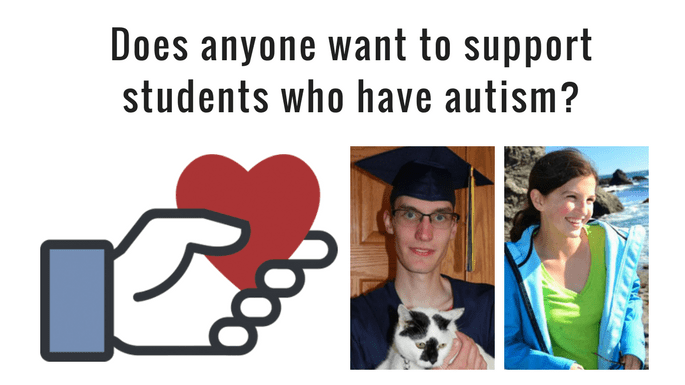This guest post is by Ivy Dulysz, a young woman on the autism spectrum who has been accepted and will be attending Nazareth College majoring in Music Therapy. Ivy applied for and won the Spring 2019 Making a Difference Autism Scholarship via the nonprofit KFM Making a Difference. You can read more about the organization and how to apply for our scholarship here. You can help our scholarship program continue to help these students by making a donation to our scholarship fund here (the majority of our scholarship program is ran through donors from our community such as yourself so no matter if you could donate anything, whether it be $5 anywhere up to $5,000 it would be making a difference!).
I’m sure anyone who is reading this right now has wondered at least once, “How different would my life be if __________ never happened?” I find myself asking that question more often this year, my senior year of high school, than ever. What if I chose a different instrument to play in fifth grade? What if I never thought to find something to do in the summer of 2016? What if my family never advocated for me to get the services I needed to lead a more independent or “successful” life?
Let’s take a step back to… spring 2003. My family notices that I am not talking and I get frustrated and anxious very easily, so they decide to take me to a developmental specialist to see what might be going on in my brain. According to said developmental specialist: not a whole lot. I was claimed to be “mentally retarded” and most probably unable to speak, develop neurologically, or care for myself. Ever.
Obviously, as you’re reading this, you can see that they were wrong. But would they have been if I didn’t get the services that I needed? I started Early Intervention as soon as possible, which consisted of three therapy sessions five days a week right at home including speech therapy, occupational therapy, and a special education “seminar” where I focused on more academic activities. Of course that seems like arduous work for a two year old who won’t even speak and needs a security toy to even move, but I got through. In fact, I thrived at Early Intervention and began to talk, learn how to read and write, how to play appropriately with others, and my anxiety and frustration subsided.
I continued this regimen for about one year until I went to a preschool in Delanson, New York called Whispering Pines, wherein I got to work and play with peers who weren’t too different from me. During this, I still got the services that I needed and continued a strict regimented schedule that someone like me needs to thrive in their environment. Full Disclosure: I still need one to this day, and that’s okay!
After graduating from preschool, I was sent to a local school in Amsterdam that had the most accommodations for students with special needs in our district called Tecler Elementary School. By this time, I was only required to participate in speech therapy and by first grade; I was declassified from my Individualized Education Program (IEP)! Of course there were some obstacles that I had to overcome without services, but I wasn’t alone. With my family’s undying love and support, I continued my schedule, learned how to calm down if I got anxious or frustrated, properly identified certain stimuli that bother me, and we worked forward from there.
Before the age of 15, I never really knew I had a diagnosis and don’t remember a lot about my early childhood. I made leaps and bounds through elementary and middle school, reaching a college reading level by the end of second grade, learning piano and, and keeping very high A’s throughout these years. Throughout middle school and the beginning high school, however, I find that I’m a little more dependent on help from my family than my peers. Of course some people need a little more help than others when learning to take care of themselves, but when I discovered I had a diagnosis of autism and that I might never be able to live an independent life, I was terrified. Of course, I have a full mental capacity that allows me to absorb stimuli and learn on multiple levels, but what if I was incapable of learning independence? I was afraid that I would have to live with my family forever! How would I go to school and get a job if I didn’t know how to live completely on my own?
With time, however, I learned that no matter how old you get, your family will never “leave you alone,” especially in the sense of love and support. I’ve since learned how to care for myself completely (except for ironing, I don’t think my grandmother will ever let me near an ironing board as long as I am under her roof).
Throughout the latter years of high school, I’ve learned more about myself with knowledge of my diagnosis: why I get anxious sometimes, why the sound of the fire alarm is almost unbearable, or why I’ve always enjoyed music. For the my entire life, music has always been a benefactor to me, be it helping me calm down, focus for a big test, or even connect with others when I’m not quite sure what to say or how to say it. By eighth grade, I had decided to pursue a career in music, but wasn’t sure which field to enter. That’s when in the summer of 2016, I decided to search for something to do within my community. I found my district’s Extended School Year Program for their students with special needs who required services year round and decided to volunteer. The moment I walked into my first class, I felt right at home and instead of observing (which was suggested since it was my first time with this population) I dove right in, feeling so familiar with these students and the struggles they face. Since then, I volunteer throughout my school district year-round and have taken on the role as a student aide and “student-teacher” for their music classes, which have inspired me to become a music therapist. I have come to call these unique individuals my best friends, the ones who I probably understand and can relate to the most. Of course, both for them and for myself, neither of our lives will ever be “normal” or without our daily struggles, but at the end of the day, no matter what disability or where on the spectrum, we are only different, not less.

Follow Kerry’s journey on Facebook, his Facebook Fan Page, & Instagram!
Kerry Magro, a professional speaker and best-selling author who is also on the autism spectrum started the nonprofit KFM Making a Difference in 2011 to help students with autism receive scholarship aid to pursue a post-secondary education. Help us continue to help students with autism go to college by making a tax-deductible donation to our nonprofit here.
Also, consider having Kerry, one of the only professionally accredited speakers on the spectrum in the country, speak at your next event by sending him an inquiry here. If you have a referral for someone who many want him to speak please reach out as well! Kerry speaks with schools, businesses, government agencies, colleges, nonprofit organizations, parent groups and other special events on topics ranging from employment, how to succeed in college with a learning disability, internal communication, living with autism, bullying prevention, social media best practices, innovation, presentation best practices and much more!

We’d also appreciate if you could take a minute to create a Facebook Fundraiser to support our nonprofit’s scholarship fund! You can learn more about how you can do just that here.














